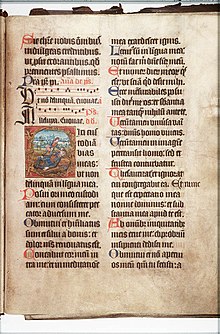| Psalm 39 | |
|---|---|
| "I said, I will take heed to my ways, that I sin not with my tongue" | |
 Psalm 39 in a Franciscan manuscript | |
| Other name |
|
| Language | Hebrew (original) |
Psalm 39 is the 39th psalm of the Book of Psalms, beginning in English in the King James Version: "I said, I will take heed to my ways, that I sin not with my tongue". The Book of Psalms is part of the third section of the Hebrew Bible, and a book of the Christian Old Testament. In the slightly different numbering system used in the Greek Septuagint and Latin Vulgate translations of the Bible, this psalm is Psalm 38. In Latin, it is known as "Dixi custodiam vias meas".[1] It is a meditation on the fragility of man before God, ending in a prayer for a peaceful life.
The psalm forms a regular part of Jewish, Catholic, Lutheran, Anglican and other Protestant liturgies and is appointed in the Anglican Book of Common Prayer to be read at funerals. It has inspired hymns based on it, and has often been set to music. It was set by Baroque composers such as Heinrich Schütz, and single verses were used prominently in major works by Johannes Brahms in Ein deutsches Requiem and by Igor Stravinsky in his Symphony of Psalms.
- ^ Parallel Latin/English Psalter / Psalmus 38 (38) Archived 7 May 2017 at the Wayback Machine medievalist.net